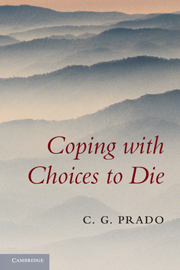5 - Two Philosophical Challenges
Published online by Cambridge University Press: 05 June 2012
Summary
In previous chapters I have apologized for introducing abstract material that might seem out of place in a book concerned mainly with what is, in the end, a very practical matter. As I have explained, the abstract material is necessary to establish a number of points regarding the rationality criterion and its application. In this chapter I consider two philosophical challenges to the rationality criterion and its application. Because of the conceptual nature of both challenges, neither can be dealt with or even be properly presented without recourse to philosophical abstraction; therefore, I will not apologize again for once more delving into the abstract. What I can do is recommend to readers that they consider the two challenges as outlined in the next couple of paragraphs and decide whether they want to read consideration of both. Those who do not feel the first challenge merits detailed consideration can skip to the discussion of the second. As will be clear, though, the second challenge is of real consequence and its discussion needs to be read by everyone before proceeding to Chapter 6.
The two philosophical challenges to the rationality criterion focus on the assessment of elective-death reasoning, though the second spills over into assessment of elective-death motivation. The first challenge is implicit in postmodern critiques of traditional conception of reason and rationality as ahistorical and universal: conception of reason and rationality as not determined by our temporally variable values, beliefs, and practices. The second challenge is an explicit one having to do with beliefs about whether or not death is personal annihilation, and is stated in Margaret Battin’s perceptive review of Choosing to Die. Battin posed the second challenge in this way:
Prado argues that the rationality criterion requires acknowledgment that death may be annihilation. Here, I think, he sees the issue from only one perspective. He ought also to consider the convinced, secular skeptic’s concerns about religions’ claims for the possibility of an afterlife, and whether this person’s choices about suicide can be rational if he or she fails to acknowledge that death may not be annihilation.
- Type
- Chapter
- Information
- Coping with Choices to Die , pp. 93 - 117Publisher: Cambridge University PressPrint publication year: 2010

